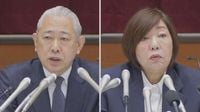On May 9, 2025, the Tokyo District Court delivered a significant ruling in the case involving Yasuhiro Sawada, the former vice president of Nihon University. The court dismissed his lawsuit against President Masako Hayashi, in which he claimed to have been subjected to power harassment, including being forced to resign, in connection with the university's handling of a drug incident involving its American football club.
Sawada sought 10 million yen in damages, alleging that he was coerced into resigning after an August 2023 press conference concerning the drug incident. He argued that following the press conference, Hayashi prohibited him from attending university meetings and manipulated the narrative to make it appear as though he bore responsibility for the situation.
The controversy surrounding the Nihon University American football club began in July 2023 when fragments of a substance suspected to be marijuana were discovered in the club's dormitory. This discovery prompted a third-party investigation, which concluded that Sawada’s failure to report the incident to the police immediately contributed to a loss of trust in the university's administration.
As a result of these findings, Sawada resigned from his position in December 2023. In his lawsuit, he claimed that Hayashi's actions constituted power harassment, asserting that he was unfairly scapegoated for the incident's fallout.
During the court proceedings, Sawada's legal team presented evidence to support his claims of harassment and coercion. They argued that the pressure he faced from Hayashi was not only unjust but also damaging to his reputation and career.
In contrast, Hayashi's defense team argued that the lawsuit lacked merit and that Sawada was, in fact, responsible for the mishandling of the drug incident. They contended that the university's decision to distance itself from Sawada was a necessary step to restore trust and accountability.
The court ultimately sided with Hayashi, rejecting Sawada's claims of power harassment and affirming the university's right to manage its administrative affairs. The ruling has sparked discussions about the responsibilities of university officials in handling sensitive issues and the boundaries of workplace conduct.
This case highlights the complexities surrounding leadership and accountability in educational institutions, especially when faced with crises that can impact a university's reputation and student safety.
As the dust settles from this ruling, it remains to be seen how it will affect the relationships within Nihon University and the broader implications for governance in higher education.




